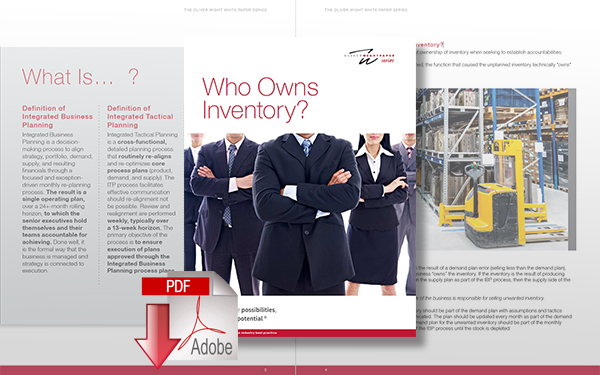Never Ask “Who Owns The Inventory?” Again - It’s The Wrong Question to Ask

Dig deep enough, and it will become evident that inventory is a symptom of other business issues, in reality, ownership of inventory should reside with the entity that owns the “root cause” of inventory.
Who Owns Inventory?
Has this ever happened in your organization: You end up selling less than was predicted by your demand plan, and it becomes unclear what to do with the unwanted leftover inventory.
Far too many businesses waste time and resources because of a disconnect between their demand, supply, and financial plans.
In our white paper, Who Owns Inventory?, Oliver Wight Principals explain how to think of inventory as a true strategic asset.
As a part of this attitude shift, you’ll develop processes that consider:
- Seasonality in your demand
- Advantageous behavior like building inventory before a new product launch
- The need for safety stock as a hedge against demand and supply uncertainties
By addressing these needs, your organization will not only reduce unplanned inventory but develop a cohesive plan for how to handle it.
The white paper also explains how these issues may be a sign of larger organizational issues, and what you can do to address them.
Asking the Wrong Questions
For most companies, asking who “owns” unplanned inventory is the wrong question and potentially a sign of deeper issues.
Rather than focusing on assigning responsibility, organizations should attempt to identify the root cause of the inventory decisions they make, whether it be a demand, supply, product management, or financial issue.
Ultimately, the concept of inventory “ownership” looks different when it is the result of an agreed-upon tactic, something this white paper can help companies foster and implement.
Having proper strategies in place means senior management can more effectively make decisions when issues arise, rather than wasting time figuring out if it falls under their purview.
Another facet of inventory management that is often ignored is lead time or the amount of time between each stage of product delivery. This is an important factor in explaining why you have inventory when you do, but may not be examined with the same level of scrutiny.
Our white paper dives into these ideas and many more, giving organizations like yours a firm idea of the tactical readjustments necessary to meet their inventory challenges.
Inventory Tactics as a Part of Integrated Business Planning
Issues with your inventory strategies are most likely not a root cause of your problems, but a symptom of them.
To ensure your business processes meet best-practices and then implemented throughout your organization, your senior leadership team should work through the Integrated Business Planning (IBP) process. IBP can help a business craft a unified vision and ensure it is structured to meet its goals.
Whether you’re looking to hone in on specific issues with inventory management or craft an organization-wide vision for the future, Oliver Wight is here to help. For more than 50 years, Oliver Wight has been raising the bar for organizations and inspiring business excellence. Is your company next?
Download Who Owns Inventory? and discover the Oliver Wight difference.
Related Resource
Who Owns Inventory?
Who owns inventory? stop the blame game, it’s a common question, but the wrong question to ask, this white paper explains why and what you should be asking. Download Now!
More Resources from Oliver Wight
Webinar | Inventory Governance: Is Your Inventory Problem Really More of a Symptom?
Video | How Do You Manage Inventory During a Global Pandemic?
Education | Inventory Governance Workshop
Related Article: Will Your Demand Management Plan Pay Off?
Article Topics
Oliver Wight News & Resources
Talking Supply Chain: Why IBP is the Future of Procurement Never Ask “Who Owns The Inventory?” Again - It’s The Wrong Question to Ask How to Change Your Supply Chain Inventory Planning Process Who Owns Inventory? Education as a Strategic Advantage Making the Case: The ROI of Demand Management Will Your Demand Management Plan Pay Off? More Oliver WightLatest in Supply Chain
Maersk Opens New 90,000-Square-Foot Airfreight Gateway in Miami GXO and Conair Open Maryland’s Largest Distribution Center Shipping Dispute Heats Up: Peloton vs. Flexport Robots are Enhancing Human Workers, Not Replacing Them Union Pacific’s Speedy New Service Connects Southern California and Chicago Talking Supply Chain: Achieving cost savings through better procurement Mexico Continues As America’s Top Trade Partner in March More Supply Chain















